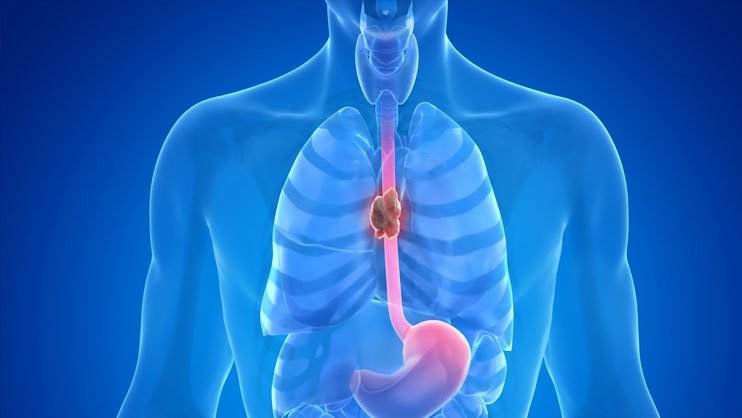Best Treatment For Esophagus Cancer in Gurgaon – Dr. Kaushal Yadav
Esophagus, also called as food pipe is a hollow muscular tube that connect throat to the stomach. It is around 20-25 cm long and 2-3 cm wide. Foods goes from mouth to stomach in abdomen through esophagus/ food pipe. When cells in esophagus lining begin to grow out of control, they form esophagus cancer.

-min.jpg)
Types: Mainly two types-
Squamous Cell Carcinoma – more common in upper and middle third part of esophagus.
Stomach cancer is 5th most common cancer and 5th most common cause of cancer related mortality in India.
Adenocarcinoma- more common in lower third part of esophagus.
Burden
Squamous Cell Carcinoma – more common in upper and middle third part of esophagus.
8th most common cancer and 6th most common cause of cancer related deaths worldwide.
There is regional variation in incidence of esophagus cancer in India.
More common in males compared to females
Esophagus cancer among highly aggressive cancers, although cure rate is improving compared to previous.
Risk Factors
Age >50 years
Tobacco
Alcohol
Gastroesophageal Reflux disease
Dietary Factors: red meat, very hot liquids, dietary deficiency of selenium/ zinc/ folate
Prior corrosive injury
Radiation exposure
Underlying esophageal diseases: achalasia, Barret’s esophagus, Tylosis
Prior history of head and neck cancer
Obesity
Genetic causes- very small no of cases
Diet rich in fruits and vegetables containing antioxidants, mineral and vitamins, dietary cereal fibers and regular physical activity are considered as protective factors.
Alarming Signs
Esophagus is among few of very aggressive cancers. It is usually diagnosed in late stages and has high mortality rate. There are no routine guidelines for screening esophageal cancer. People who have a high risk for esophageal cancer like Barret’s esophagus, genetic predisposition or precancerous conditions should be followed closely. Disease diagnosed in early stage has better cure rates. Although symptoms appear in advance stage, following symptoms should be looked with high index of suspicion and doctor should be consulted regarding endoscopy or other investigation requirements.
Difficulty in swallowing which is gradually worsening starting with solid food.
Pain or burning feeling in chest
Weight Loss
Vomiting
Blood loss presenting either as blood staining in vomiting or anaemia
Cough or hoarseness of voice
- Fistula with airways : Tracheoesophageal or brochoesophageal fistula leading to pulmonary complications
Investigations
Upper GI Endoscopy and Endoscopic Ultrasound with Biopsy – most common procedure for initial evaluation and confirmation of diagnosis.
CECT/ PET CECT- for pretreatment disease extent evaluation both at primary site and distant site.
Bronchoscopy – in case of suspected airway involvement.
Diagnostic laparoscopy/ thoracoscopy
Best Doctor For Esophagus Cancer Treatment in Gurgaon
Surgery - Most of the esophagus along with a small upper part of stomach and regional lymph nodes are excised. Remaining stomach is formed as a tube and reconnected to upper esophagus to that food can be swallowed normally. Esophagectomy is the mainstay of treatment for middle and lower esophagus cancer. It is a major surgery and it can be performed either by open or minimal invasive technique. Proper assessment and optimization by surgical oncologist is very important aspect of treatment, so patient must show to a surgical oncologist since the start of treatment.
Nutritional rehabilitation is also an important aspect of whole treatment. In severe dysphagia nasogastric tube feeding or esophageal stenting or feeding jejunostomy are most commonly methods to establish proper enteral feeding of patients.
Radiation therapy - Mainstay of treatment for upper esophagus cancer. May be given before surgery as neoadjuvant therapy in advance stages.
Chemotherapy often combined with radiation therapy in curative settings. May be given before surgery as neoadjuvant therapy in advance stages. In metastatic patients it the treatment mostly used.
In metastatic patients often palliative intervention is also required like esophageal stenting for absolute dysphagia and tracheoesophageal fistula.
Immunotherapy and targeted therapy are also options in selected advance metastatic cases.
Prevention
Avoid tobacco and alcohol.
Eating a healthy diet rich in fruits and vegetables
Regular physical activity and Maintaining a healthy body weight
Treating reflux disease (heartburn)
Endoscopic surveillance in high risk cases like Barret’s esophagus.
Prognosis
| Stage | 5 years Survival |
|---|---|
| I+II | around 50% |
| III | 25% |
| IV | <5% |

